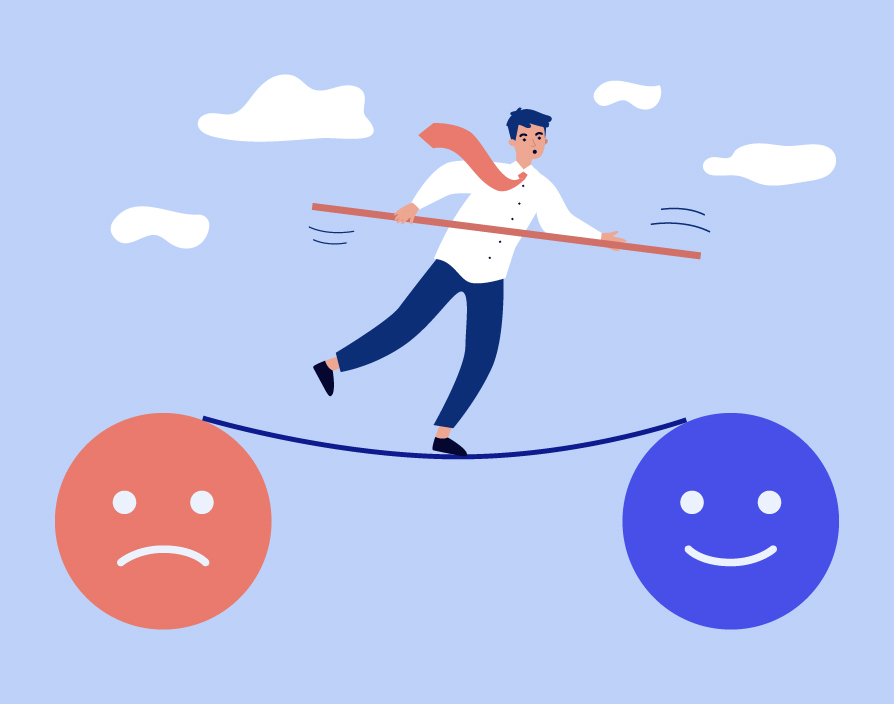According to a government study by the Health and Safety Executive, stress, anxiety or depression accounted for over 50% of all work-related ill health in 2020/21. That figure is frighteningly high, isn’t it? Having said that, it’s also fair to say that stress does get its fair share of bad press. How many times do you ever hear it mentioned in a positive context? Very rarely. So, the first thing we need to be clear about is that there is a difference between ‘good’ and ‘bad’ stress, and the trick is to understand where the dividing line is.
The Yerkes-Dodson law
Back in 1908, two psychologists, Yerkes and Dodson discovered that mild electric shocks could be used to motivate rats to complete a maze, but when the shocks became too strong, they would start panicking and scurry around the maze haphazardly in an attempt to escape. This became the basis of the Yerkes-Dodson Law which suggested there is a clear link between performance and arousal. For example, an optimal amount of stress will help you focus on an exam and remember all the key facts. You might feel energised, stimulated, even exhilarated. That is ‘good stress’ and this might help you perform even better. But too much anxiety can impair your ability to remember anything worth writing down on the exam paper. You might freeze and become incapable of thinking straight. That’s ‘bad stress’, when you might not even perform at all. And this can happen to anyone.
The Yerkes-Dodson Law applies in most areas of human performance.
Dripping tap syndrome
So you need to be very mindful of the critical point at which ‘good stress’ starts to morph into the more destructive ‘bad stress’. Unfortunately, this is not always completely obvious. Let me use another metaphor to explain why.
A study was conducted in 2016 involving 2000 people. Its objective was to find out the most annoying everyday noises. These were the top 5: 1. Snoring; 2. Loud chewing; 3. A dog barking; 4. Fingernails running down a chalk board; 5. Loud slurping from tea or coffee. There were some quite amusing entries further down the list: ‘People kissing loudly’ came in at number 25, the ‘Crazy Frog Song’ was at 26, and ‘loud yawns’ made the chart at number 40!
The noise that irritates me most comes in at number 16: Dripping taps. Particularly in the dead of night when I’m in between the conscious and unconscious. Taken in isolation, one drip is not particularly bothersome, but over time, the metronomic nature of drip, drip, drip, drip begins to have an increasingly adverse effect on me. The noise seems to become louder and louder and my discomfort is caused as much by the anticipation of the next drop as it is by the sound of the drop itself.
Dripping tap syndrome is a powerful metaphor for the impact of stress on the human brain, describing the journey from ‘good’ to ‘bad’ stress.
You start off not feeling much discomfort. Little things begin to irritate and apply pressure in different places. Drip… nothing too painful, but persistent, nonetheless. Drip… drip… Soldier on, this will pass. Pressure builds. Drip… drip… drip… Things become more and more uncomfortable. You feel trapped and slightly claustrophobic. Drip… drip… drip… drip… More pressure. Is it imagined or is it real? Doesn’t matter, either way you still feel trapped.
Then one day, without warning, the flood gates open and you are no longer in control of your own destiny.
The key thing is to be able to retain the ability to turn off the dripping tap before it’s too late.
Early warning system
So far we have concluded that in order to avoid the fate of the confused rat, you need to know how and when to turn off the stress tap!! I would like to use a third metaphor to explain how best to do this. The purpose of any early warning system is to put in place a series of measures whose sole purpose is to avoid ‘bad’ things escalating. Nipping them in the bud before they gather momentum and start to cause unwanted havoc.
These are some of the measures I have put in place to manage my own stress levels:
I ensure that each and every day, I get the basics right. Eating properly, sleeping well, exercising sufficiently, socialising enough, not working too hard.
I monitor my own mood. Am I happy, smiling, laughing, enjoying, bantering? If not, why not? What’s the problem?
I check my perspective. Am I devoting enough time and energy to others around me or am I too preoccupied with myself? Too much introspection is not good for your mental health.
I ask my wife to act as the ‘stress police’. If she senses that I am not quite myself, if I am not carrying out the three measures outlined above, then she has complete authority to step in and take action.
The different facets of my early warning system are certainly not rocket science. They seem kind of obvious, don’t they? But it’s important to remember that ‘bad stress’, if left unchecked, can cause significant mental, emotional and physical damage. It can creep in underneath the radar when you are busy with life and living. So whatever steps you can take to help you manage the volume, the more likely it is that you will prevent your good stress from turning bad, or worse still – ugly!
“
Share via:








































